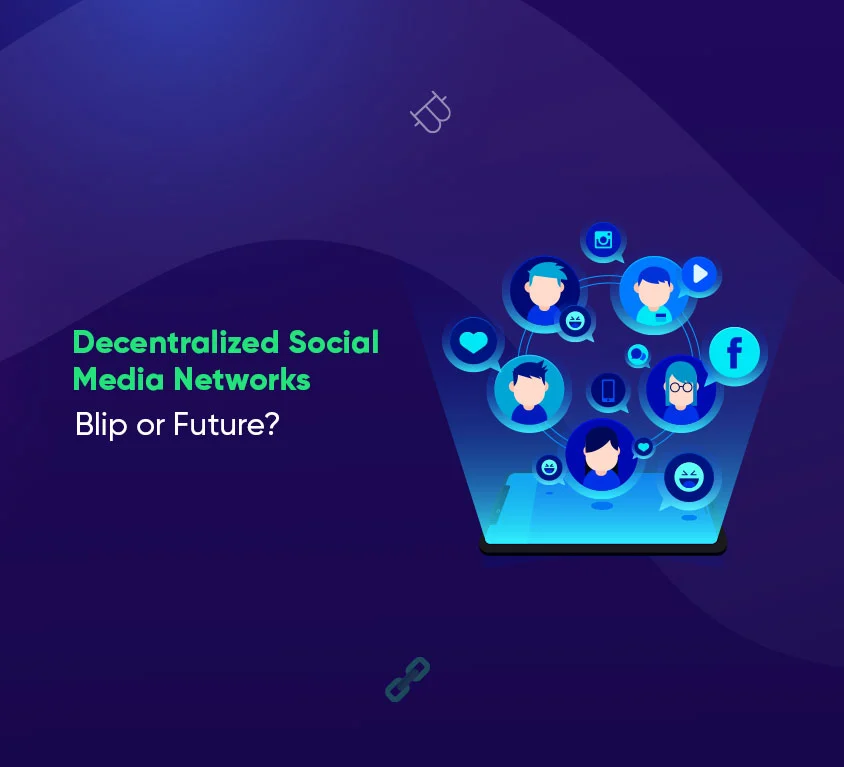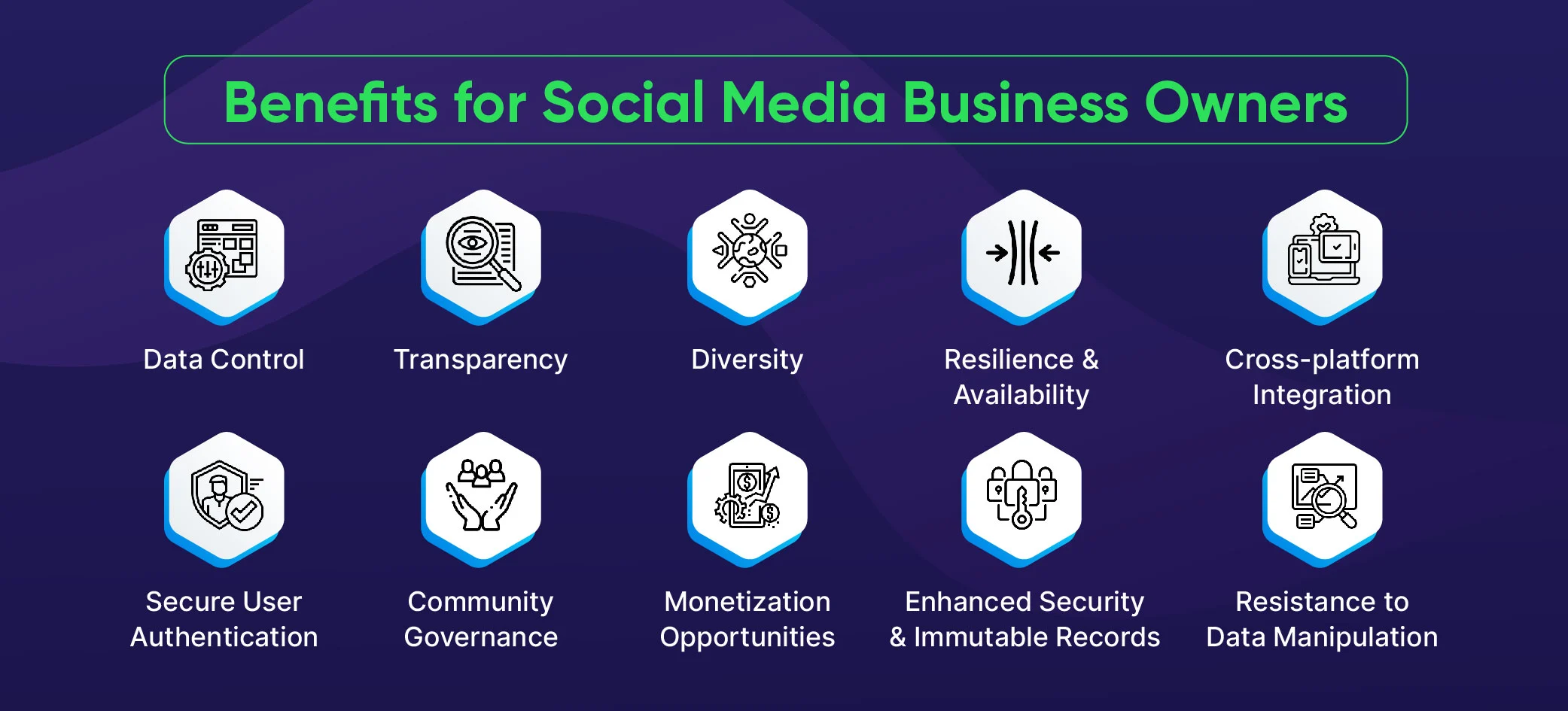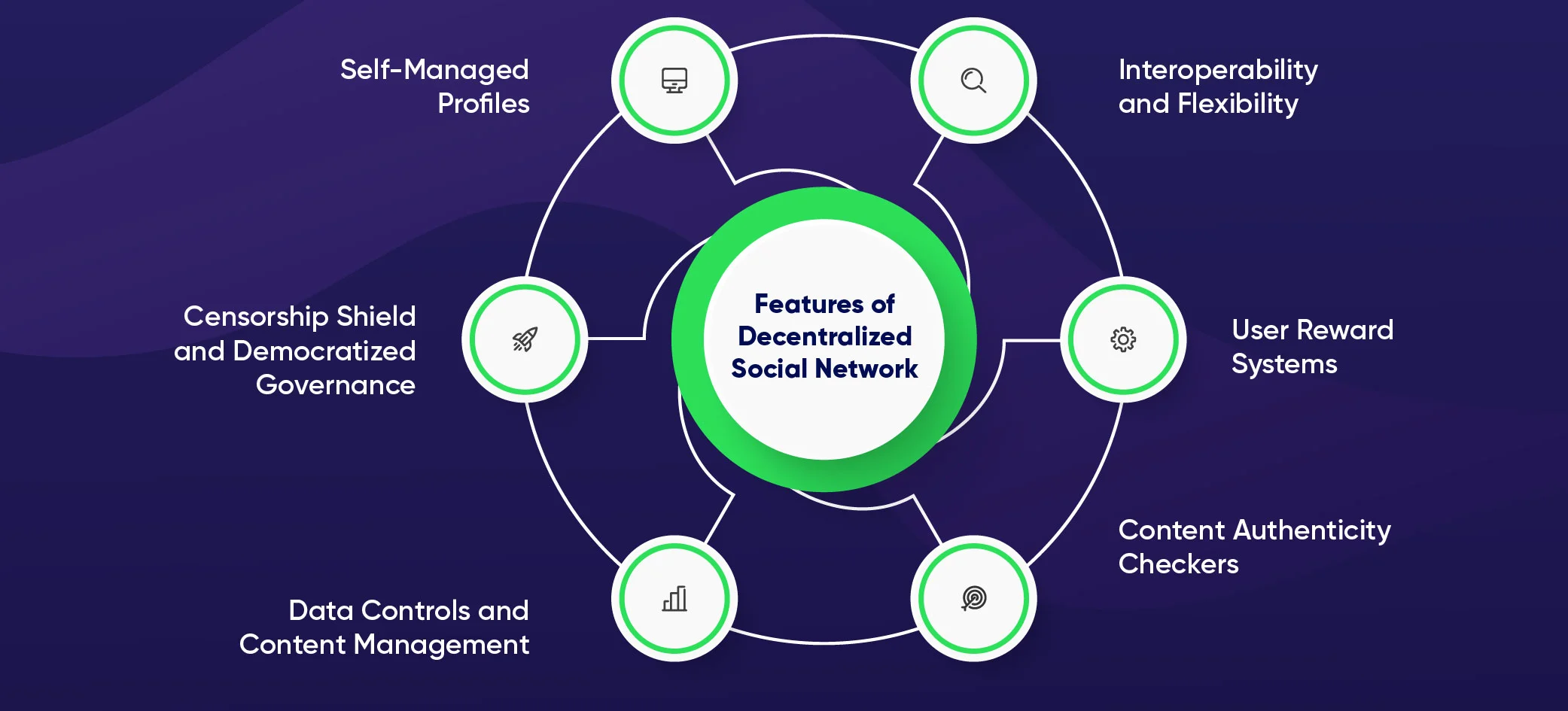
Introduction
Blockchain & Web3 Services Trusted By Leaders
- Develop innovative solutions using our state-of-the-art blockchain expertise.
- Achieve accelerated growth with robust & scalable Web3 consulting.
- Unlock 360-degree security with our top-rated blockchain development.
Decentralized Social Media Networks: Blip or Future
Have you ever imagined that social media platforms integrated with blockchain could ensure the authenticity of every piece of content shared? Blockchain has caused significant changes in a variety of industries, including media, entertainment, and the music industry. However, the rise of social media platforms (which came in 2000) marked a significant shift in media consumption habits. Platforms like Facebook, Twitter, and Instagram are the mains that revolutionized communication. Not only communication but also content sharing, providing users with unprecedented connectivity and real-time information sharing. Fast forward to the present day with another transformative wave: Blockchain technology. It has numerous applications, and Blockchain-based social platforms will be in the spotlight in 2024. In this blog, we’ll look at how blockchain is transforming the social media industry in terms of media consumption and distribution and whether is it only a startup or will be the future. Let’s find out;Current Social Network Landscape
Do you know, that Meta Platforms has an astonishing user base of nearly 3 billion people across its suite of apps, which includes Facebook, Instagram, and WhatsApp? These platforms have become an integral part of our daily lives, serving as a tool for connecting with friends, consuming content, and expressing ourselves online. However, their widespread use raises concerns about the concentration of power and influence in the hands of a small number of corporations. While the rise of these major social media platforms has undoubtedly transformed how we communicate and share information, it has also raised serious concerns about privacy and data security. With such large amounts of personal information stored and processed on these platforms, there is concern that user data may not always be adequately protected, leaving individuals vulnerable to exploitation or misuse. Furthermore, centralized control of the online landscape raises concerns about transparency, accountability, and the preservation of diverse perspectives. However, The lack of competition in social media hinders innovation and prevents alternative platforms from prioritizing user privacy and security. Blockchain technology can enhance data privacy and security by providing transparent and tamper-proof systems for managing user data. This empowers users with greater control over their personal information, ensuring transparency and accountability in data management practices.Issues With Centralized Social Media Platforms
Centralized networks are criticized for their centralized control. Moreover, the concentration of power in the hands of a few big names has raised concerns about social media privacy and data security, given that these platforms store and process large amounts of personal information. Let’s explore some of the challenges with centralized social media platforms;- Current social networks have limitations due to their centralized architecture.
- Concerns about privacy and data security stem from the large amounts of personal information stored and processed on centralized platforms.
- Centralized control of the online landscape raises questions about transparency, accountability, and the preservation of diverse viewpoints.
- The lack of competition in social media stifles innovation and prevents other platforms from prioritizing user privacy and security.
- Scalability, privacy, security, and data management are some of the challenges associated with decentralized social networks.
- Attempts to address specific issues related to decentralized social networks, such as privacy, security, scalability, and data management.
- Increased internet & smartphone usage.
- Availability of structured user analytics for business marketing.
- Increased eCommerce adoption & online shopping.
- More engaging social media content.
- Investments in AI, big data, real-time analytics.
- Easy access to cloud computing solutions via SaaS.
Decentralized Social Media Networks: The Future of Online Interaction
Blockchain technology is propelling social media toward decentralized networks that value user privacy, security, and control. These platforms function without a central authority, ensuring transparency, immutability, and censorship resistance via blockchain’s distributed ledger. Users retain control over their data and identities while participating in community-driven content moderation and governance. Smart contracts and tokenomics incentivize participation while automating interactions. Decentralized social media networks are a promising alternative to centralized platforms, ushering in an era of user-centric, democratic online interaction. Let’s take a look at the characteristics of blockchain and whether it can succeed in making decentralized social networks a reality or just a failed startup.Core Features of Blockchain
- Decentralization: Unlike centralized platforms, blockchain-based social networks operate on a distributed network of nodes, eliminating the need for a central authority.
- User Ownership: Users retain ownership and control over their data, with encryption techniques ensuring privacy and selective data sharing.
- Censorship Resistance: Content recorded on the blockchain is immutable, promoting freedom of expression and preventing censorship.
- Community-driven Moderation: Users participate in content moderation, ensuring diverse viewpoints and user empowerment.
- Smart Contracts: Backend code facilitates transparent and trustless interactions among users, automating predefined rules and conditions.
- Token Economies: Digital currencies incentivize participation and reward content creators, fostering an engaged ecosystem.
- Community Governance: Decentralized decision-making through DAOs ensures transparent and inclusive platform governance.
What is Blockchain Social Media?
Blockchain social media is simply putting the use of decentralized ledgers in social media platforms to enhance transparency, security, and user control. This integration aims to reduce censorship, privacy violations, and misinformation by decentralizing data storage and processing. Blockchain in social media offers various benefits including, incentivized content creation, decentralized governance, and transparent revenue sharing, revolutionizing social network engagement.Decentralized Social Media vs. Traditional Social Media
|
Comparison |
Decentralized Social Media |
Traditional Social Media |
|---|---|---|
| Control | Decentralized Governance | Centralized Governance |
| User Data Handling | Data Privacy Control | Limited Data Privacy |
| Freedom of Expression | Censorship Resistance | Censorship Prone |
| Network Operations | Auditability | Lack of Transparency |
| Intellectual Property | User Control Ownership | Platform Ownership |
| User Engagement | Incentivized Participation | Non-Incentivized Participation |
| Infrastructure Dependence | Network Resilience | Vulnerable to Shutdowns |
How Decentralized Social Media Works?
Decentralized social media employs blockchain technology to distribute control and ownership among network participants, reducing reliance on a single authority. It runs on a distributed network of nodes, with each node storing a copy of the platform’s data and participating in transaction processing. Peer-to-peer communication improves privacy while reducing reliance on centralized servers. Blockchain technology stores data and transactions, ensuring transparency, security, and resistance to censorship. Encryption techniques and cryptographic keys ensure that users retain ownership of their data, identities, and interactions. Community-driven governance mechanisms involve users in decision-making processes, which promotes transparency and inclusivity. It is also possible to incentivize user participation using digital tokens or cryptocurrency. Decentralized social media provide a more democratic and resilient alternative to traditional centralized platforms.Benefits for Social Media Business Owners
Some major social media platforms have undoubtedly changed how we communicate and share information. This transformation also happened to business owners, and here are some of the major benefits listed;
- Enhanced Security & Immutable Records: Blockchain’s distributed nature, combined with cryptography techniques, ensures enhanced security and tamper-resistant interaction records.
- Data Control: Users have more control over their personal information, and censorship-resistant features ensure privacy.
- Transparency: Blockchain technology and smart contracts promote transparency and trust by automating and verifying interactions.
- Resistance to Data Manipulation: Blockchain-based social networks are more resistant to censorship and data manipulation by central governments.
- Monetization Opportunities: Users can directly monetize their content using tokenization, NFTs, and cryptocurrency rewards.
- Community Governance: Decentralized networks enable community-driven decision-making processes and decentralized governance models.
- Secure User Authentication: Users are identified and authenticated using a secure public key infrastructure, which employs cryptographic techniques to verify user identities without relying on a central authority.
- Cross-platform Integration: Blockchain protocols can support multiple chains, allowing for seamless integration with other decentralized applications and platforms.
- Resilience & Availability: Distributed architecture improves resilience and availability. There is no single point of failure, making it difficult to shut down or disrupt the network.
- Diversity Decentralized networks promote innovation by enabling developers to create dApps that interact with the network via open protocols and APIs, thereby encouraging diversity and competition and resulting in a more vibrant ecosystem.
Features of Decentralized Social Network
Decentralized Social Networks empower users to curate their online experiences according to their values and preferences, while serving as a censorship shield, ensuring their rights to free speech are protected and their voices heard. Here are some of the features listed;
- Self-Managed Profiles: Users retain control over algorithms and user-generated content, promoting independence in the absence of a central governing authority.
- Censorship Shield and Democratized Governance: Gives users independence from third-party companies while preserving freedom of speech and expression.
- Data Controls and Content Management: By eliminating central authorities, users can create their own rules for data use, transfer, and monetization. Blockchain authentication ensures maximum confidentiality and eliminates the risk of data leakage.
- Content Authenticity Checkers: Distributed consensus technologies ensure that content is original and trustworthy, thereby combating fake news and unauthorized content cloning.
- User Reward Systems: To monetize user engagement, reward actions such as likes, views, shares, and votes.
- Interoperability and Flexibility: Emphasizes universal accessibility and flexibility, supporting a diverse set of assets and blockchain platforms.
Examples of Decentralized Social Networks
Some examples of decentralized social network startups include;
-
Sapien
Sapien a news network is an Ethereum-based decentralized news network. It provides both public and private news browsing options and uses a subscription-based model for various interest areas. Users can enjoy a customized news feed based on their preferences, as well as end-to-end encryption in the chat facility.
-
Steemit
Social media with a reward system. Steemit is an incentives-based, peer-to-peer social media network that monetizes and rewards content publishers with cryptocurrencies. Users earn points for various actions such as publishing, voting, and curating content, as well as purchasing STEEM tokens. Additionally, Steemit employs a user-verification process before allowing registration.
-
Indorse
Indorse is a LinkedIn-like social media network for businesses built on the Ethereum blockchain. It rewards users who endorse and prove their skills. Advertisements on the platform are purchased using IND Tokens, and a portion of these tokens is shared with content creators.
-
Sola
Sola is a social network for creators that utilizes both blockchain and artificial intelligence technologies for viral content creation. Its revenue model includes advertisements, user payments, and partnerships. Moreover, Sola offers mobile applications for both iOS and Android platforms, along with an API for developers to integrate with the platform.
-
Vevue
Vevue is a blockchain-powered social platform that helps video sharing and rewards users for creating authentic content. It differentiates itself from traditional social media applications by focusing on video sharing and leveraging blockchain technology to facilitate rewards for users who contribute genuine content.